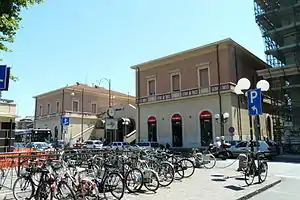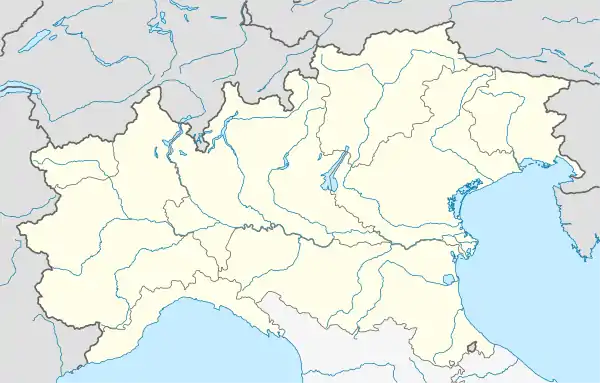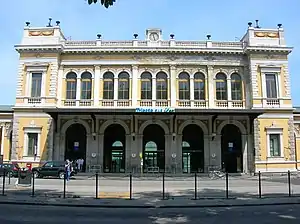Chiavari railway station
Chiavari railway station (Italian: Stazione di Chiavari) serves the town and comune of Chiavari, in the Liguria region, northwestern Italy. Opened in 1868, it forms part of the Pisa–La Spezia–Genoa railway, and is situated between La Spezia and Genoa.
Chiavari | |
|---|---|
 The passenger building. | |
| Location | Corso Angelo Gianelli 16043 Chiavari GE Chiavari, Genoa, Liguria Italy |
| Coordinates | 44°18′54″N 09°19′21″E |
| Operated by | Rete Ferroviaria Italiana Centostazioni |
| Line(s) | Pisa–La Spezia–Genoa |
| Distance | 37.654 km (23.397 mi) from Genova Piazza Principe |
| Train operators | Trenitalia |
| Connections |
|
| Other information | |
| Classification | Silver |
| History | |
| Opened | 23 November 1868 |
| Location | |
 Chiavari Location within Northern Italy | |
The station is currently managed by Rete Ferroviaria Italiana (RFI). However, the commercial area of the passenger building is managed by Centostazioni. Train services to and from the station are operated by Trenitalia. Each of these companies is a subsidiary of Ferrovie dello Stato (FS), Italy's state-owned rail company.
Location
The station is located in a passageway between the town centre and the promenade.
Originally, there was a railway bridge linking Piazza Nostra dell'Orto (north of the station) and Piazza Vittorio Leonardi (to the south). In the early seventies, this bridge was demolished and the pedestrian underpass, which connects only the first track, was extended in both directions. Since then, the underpass has been used as a link between the two parts of the city.
Features
The passenger building is a masonry structure on two levels, of which only the ground floor is open to the public. The architecture of the building is original and hard to find at Italian railway stations: it is composed of two buildings joined together by a gallery in which there are many amenities for travelers.
The station once had a goods yard with an adjoining goods shed. However, the goods yard has since been dismantled and replaced by a parking lot for FS employees, and the warehouse has been converted to storage. The architecture of the former warehouse is very similar to that of other Italian railway stations.
There are additional buildings, either on one or two levels, housing the RFI technical departments. The architecture of these buildings is very similar to the two bodies that make up the passenger building. The layout of all the buildings is rectangular.
The station yard has three tracks dedicated to passenger service. In detail:
- Track 1 : the main platform for trains towards Pisa;
- Track 2 : used mainly for trains towards Genoa and sometimes used for overtaking or unusual right hand running of trains;
- Track 3 : priority track in both directions.
Tracks 4 and 5 are equipped with a starting signal at the Genoa end, and are sometimes used for the overtaking or stopping of short goods trains. During the process of extending the shelter of the platform 2 shelter, which took place in the early 1970s, the passenger service to Genoa was performed using track 4, which had been temporarily fitted with a wooden platform.
Passenger and train movements
The station has about 3.4 million passenger movements each year.[1] It is served by trains of all categories, from regional to Frecciabianca services. The main destinations are Genova Brignole, La Spezia Centrale, Pisa Centrale, Roma Termini, Milano Centrale and Torino Porta Nuova.
Interchange
In front of the passenger building is a bus stop for urban and suburban buses, operated by AMT Extra (formerly ATP).[2]
See also
References
- "Flussi Annui nelle 103 Stazioni" [Annual flows at the 103 stations]. Centostazioni website (in Italian). Centostazioni. Archived from the original on 9 February 2010. Retrieved 8 December 2010.
- "Interscambio Treno-Autobus Liguria - Lettera C" [Interchange Train-Bus Liguria - Letter C]. Trenitalia website (in Italian). Trenitalia. Archived from the original on 16 July 2011. Retrieved 9 December 2010.
External links
![]() Media related to Chiavari railway station at Wikimedia Commons
Media related to Chiavari railway station at Wikimedia Commons
- Description and pictures of Chiavari railway station (in Italian)
This article is based upon a translation of the Italian language version as at December 2010.

